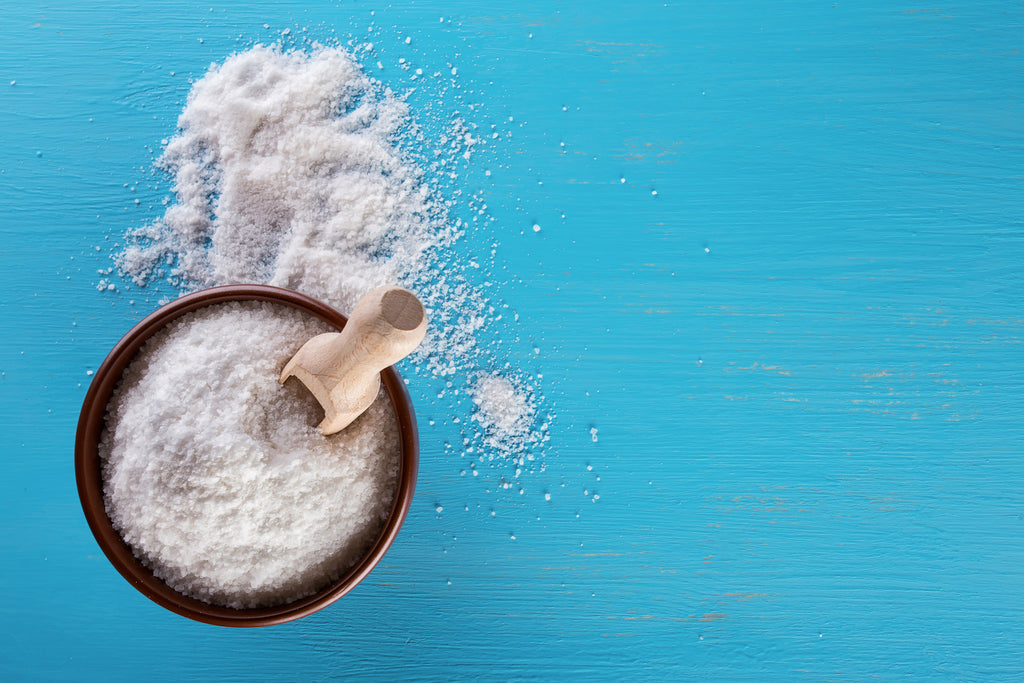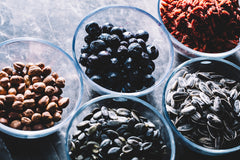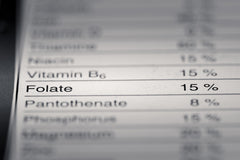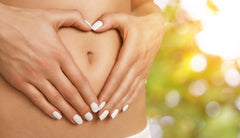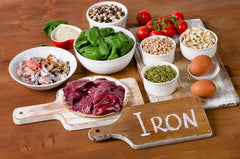Carmela Pengelly is a dietary therapist and nutritional therapist, trained in the UK. She now lives in Perth, Western Australia, where she practices as a nutritionist, specializing in SIBO (small intestinal bacterial overgrowth), methylation issues, and vegan/vegetarian diets. She also offers consultations outside of Australia, via Skype.
Iodine deficiency is becoming a major health concern in the UK. We can’t live without it and our babies and children rely on it for healthy growth and development. Around 40% of the worldwide population is at risk of deficiency, according to the American Thyroid Association. Low iodine is the top preventable cause of brain damage and retardation worldwide.
For all of these reasons, it’s important to not only monitor and test for iodine deficiency but to take action when it is suspected. Learn how to tell if you have a problem, what to do about it, and how to prevent it in the future.
What Do We Use Iodine For?
Iodine is a critical raw ingredient used to make thyroid hormones. This essential mineral can only come from our diet or supplementation, as we can’t synthesise it ourselves.
Thyroid hormones control metabolic processes (i.e biochemical activity) in the body. They are responsible for regulating protein synthesis, growth, enzymatic activity, and the generation of heat.
The Growing Child
Thyroid hormones control brain and nervous system development in unborn babies and young children.

This is why it is crucial for pregnant women to have adequate iodine, as they supply thyroid hormones to their babies in the early stages of pregnancy. After about 12 weeks of gestation, the foetus can make its own thyroid hormones, but it can’t do this without its mother’s supply of iodine.
Breast Cancer Buster
Iodine is found in several organs in the body, and scientists are now discovering its important role in sex hormone balance and keeping the breast healthy.
Breast cancer incidence is much lower among Japanese people and experts believe this is partly because iodine-rich seaweed is part of their staple diet. Research shows that iodine acts as an antioxidant in the breast and can prevent tumours from growing and initiate cancer cell death.
Iodine can also help women suffering from painful fibrocystic breast disease.
Prostate Relief
Iodine similarly has anti-cancer properties in the prostate gland, and may benefit men suffering from an enlarged prostate, known as benign prostatic hyperplasia (BPH).
Iodine has been shown to considerably improve urine flow rate in BPH sufferers where the prostate presses on the urethra.
How Common Is Iodine Deficiency?
Deficiency is following a downward trend in developing countries, but, conversely, is becoming a growing problem in industrialised countries. The UK is in the top 10 of nations worldwide with the lowest iodine status, and a shocking 60% of pregnant women fall below recommended intake.
Experts have flagged up teenagers as an at-risk population in the UK, following a large study of 800 teenage girls that found 70% were deficient.
This wide-spread deficiency is partly blamed on the lack of any government iodisation programme in the UK. Other countries add iodine to either salt or bread.
5 Reasons Why You (And Your Children) Should Consume Iodine
Most of the known consequences of iodine deficiency relate to compromised thyroid function.
- Goitres
A goitre is an obvious and unmistakeable sign of iodine deficiency – you end up with a very enlarged thyroid gland in the neck, called a goitre.
Goitres used to be more common, especially among specific populations who relied exclusively on low-iodine food grown in their local area. For example, in Derbyshire in the 1800s, the disorder was nicknamed Derbyshire neck.
Regions such as Derbyshire have very alkaline soils, which bind iodine, preventing sufficient uptake by plants.
Thankfully, the availability of food from diverse geographical areas means that iodine has become easier to obtain from fresh produce. In addition, farmers started adding iodine to cattle feed in the 1930s, which has considerably boosted the iodine content of dairy products.
Very large goitres are not often seen nowadays.
If you have a goitre, it may not at first be that obvious, but look out for accompanying symptoms:
- A persistent cough
- A tight feeling in the throat
- A choking feeling
- Difficulty swallowing
- Difficulty breathing
Most goitres are benign but, occasionally, nodules within the goitre can become cancerous. See your doctor if you think you might have a goitre.
- Underactive Thyroid
With or without a goitre, lack of iodine can cause hypothyroidism, where the body struggles to produce enough thyroid hormones and becomes underactive.

I once had a teacher who used to fall asleep in the middle of the lesson on a regular basis; she had a very large lump in her neck, her speech was slow with pauses in between words, and she was very overweight. Looking back, I realise now that she had a classic goitre and hypothyroidism.
The most common signs and symptoms of hypothyroidism include:
- Tiredness
- Goitre
- Difficulty losing weight
- Feeling cold all the time
- Hair loss
- Constipation
An underactive thyroid is usually diagnosed by measuring your TSH (thyroid stimulating hormone) levels.
- Brain Damage
Unborn babies and young children are the most at risk from iodine deficiency. Even very mild hypothyroidism in pregnant women can cause irreversible brain damage in the foetus.
The main problems include:
- Lower IQs – A UK study of over 800 pregnant women found that mean IQ was 3.4 points lower in the children of mothers with iodine deficiency
- Lower reading comprehension and reading accuracy
- Increased risk of ADHD(attention deficit/hyperactive disorder)
- Deaf mutism (in cases of severe deficiency)
Pregnant women have a much greater demand for iodine as thyroid hormone production goes up by as much as 40% to support the baby’s growth and development.
As we’ve mentioned above, most doctors measure TSH to assess thyroid health, but in pregnancy a direct measure of the thyroid hormone, T4, gives you the best guide to whether or not your baby is getting enough of your hormones.
- Poor Bone Development
Iodine deficiency in children also affects skeletal development. Significantly greater numbers of children in low iodine areas tend to be shorter than averageand animal studies link deficiency with weaker bones.
- Fertility Problems
Low thyroid hormone output due to low iodine affects fertility and reproductive health. Even a slightly underactive thyroid is known to increase risk of infertility, miscarriages, and preterm births.

Iodine is also important because of its influence on the balance of sex hormones.
The Iodine Tightrope
You can have too much of a good thing.
It’s important to ensure adequate intake of iodine, but, if you have too much your thyroid can downregulate hormone production and become underactive.
If you have a family history of autoimmune diseases excess iodine can trigger Hashimoto’s disease, where antibodies attack the thyroid gland. If you already have Hashimoto’s, iodine can make it worse.
Occasionally, increasing iodine intake can result in an overactive thyroid and trigger Grave’s disease, another autoimmune disorder which causes hyperactivity of the gland.
Go carefully with seaweed products, particularly kelp which can be very high in iodine. Some commercial kelp products can contain as much as 8,000 micrograms of iodine per gram! The recommended daily iodine intake for most adults is 150 micrograms. If you’re taking kelp as a supplement, check the amount you’re getting per tablet.
If your child is drinking excessive amounts of milk, it’s possible that they may get too much. Organic milk is lower in iodine than non-organic, so you may want to switch to organic if they are having a lot of dairy.
Milk produced in winter has morethan double theiodine content of summer milk (210 micrograms per litre in winter versus 90 micrograms per litre in summer). So you may need to cut back your child’s intake in the winter.
Iodine Strategy
It can be confusing to know whether or not you are getting too much or too little iodine. The best advice is to look at how many iodine-rich foods you are consuming in your typical daily diet (see the table below). If it is not many, then adding a good multivitamin every day should meet all your iodine needs. Nu U Nutrition Multivitamin offers the RDA for iodine alongside the other vitamins and minerals needed for balanced nutrition.

Don’t eat extra iodine-containing foods or take supplements if you are:
- Eating a lot of kelp-based foods
- Taking medication that is high in iodine, for example the heart medication, amoridione
- Using iodine-containing mouthwashes on a regular basis
If you have a thyroid disorder or family history of autoimmune disease, it is generally safe to take a multivitamin that contains a small amount of iodine (up to 100 micrograms). Speak to a healthcare practitioner if you have concerns.
Don’t Forget About Selenium and Iron
Along with iodine, selenium is a raw ingredient needed to make thyroid hormones. Look for a multivitamin that contains both of these minerals.
If you have an autoimmune thyroid disease or a family history of these disorders, never take iodine without adequate selenium.
Iron is also essential as this is needed for the enzymes that manufacture thyroid hormones.
|
Best Food Sources of Iodine |
|
|
Food |
How Much Iodine (Approx. Micrograms) |
|
1 Cup milk (250 ml) |
60 - 125 |
|
1 Cup organic milk (250 ml) |
35 - 70 |
|
150 g Yoghurt |
50 - 100 |
|
40 g Cheese |
15 |
|
1 Egg |
25 |
|
120 g Haddock |
390 |
|
120 g Cod |
230 |
|
100 g Salmon fillet |
14 |
|
100 g Tinned tuna |
12 |
|
60 g Prawns |
6 |
|
100 g Meat or poultry |
10 |
|
1 g Iodised salt |
25 - 65 |
|
Sushi made from 1 sheet nori |
32 |
|
1 g Kelp granules |
|
|
Main source: British Dietetic Association |
|
Why Toothpaste and Tea Can Be Bad For You
Fluoride, bromide and chloride are similar in chemical structure to iodine (iodide) and can block its uptake by the thyroid gland.
Some studies have demonstrated that fluoridated water can lower thyroid hormone output. Fluoride is added to drinking water in some parts of the UK, reaching around 10% of the population, and a few small pockets of England have naturally-occurring fluoride.
It’s worth investing in a good water filter at home to reduce intake of fluoride. And if you are concerned there are many natural toothpastes on the market that don’t contain this mineral.
Both fluoride and bromide are found naturally in tea. This doesn’t mean to say that you should give up your cuppa altogether but just avoid excessive tea drinking throughout the day. This includes black and green teas.
Chlorinated water also reduces thyroid uptake of iodine – another good reason to drink filtered water whenever you can.
Should You Cut Back on The Cabbage?
Natural substances, known as goitrogens, can sometimes be a problem as they also inhibit the thyroid’s uptake of iodine.
It’s a bit of a health conundrum as foods high in goitrogens are also the most beneficial in normal circumstances. These plant chemicals are found in cruciferous vegetables, including cabbage, kale, broccoli and cauliflower, as well as soy beans.
Cigarettes also contain goitrogenic substances.
You should definitely give up smoking but there is no need to give up eating these nutritious foods. Goitrogens only cause problems if you consume them excessively, and most people are unlikely to overdo the Brussels sprouts and cabbage.
Limit soy milk, miso and tofu to a few servings a week.
Choose raw rather than cooked versions of these foods as heat helps to reduce goitrogen content.
Of greatest importance is ensuring you have adequate intake of iodine, as these substances will generally only impact thyroid health when iodine is low.
Testing
Iodine can be measured in a urine test. This is not routinely done by GPs as it is a relatively expensive test. They can be done by other healthcare practitioners, such as nutritionists and naturopaths.

The iodine test is not entirely accurate, however, as it only gives you a snapshot of your iodine levels at the time of the test, rather than your long-standing iodine status. To get a clearer picture of whether or not your iodine needs are being met, it’s a good idea to team an iodine test with a battery of thyroid hormone tests.
Ensuring Proper Iodine Intake for a Healthier Life
Whether you meet one or more of the risk criteria for iodine deficiency or you are concerned about future problems because you are planning a family, take the time to address those concerns. Speak with a doctor to get tested and then supplement your diet to support proper iodine intake.
You can read more about Nu U Nutrition’s Multivitamin formula, designed to ensure you get what you need on a regular basis here, and be sure to speak with your doctor about dietary solutions that can help supplement your needs.

